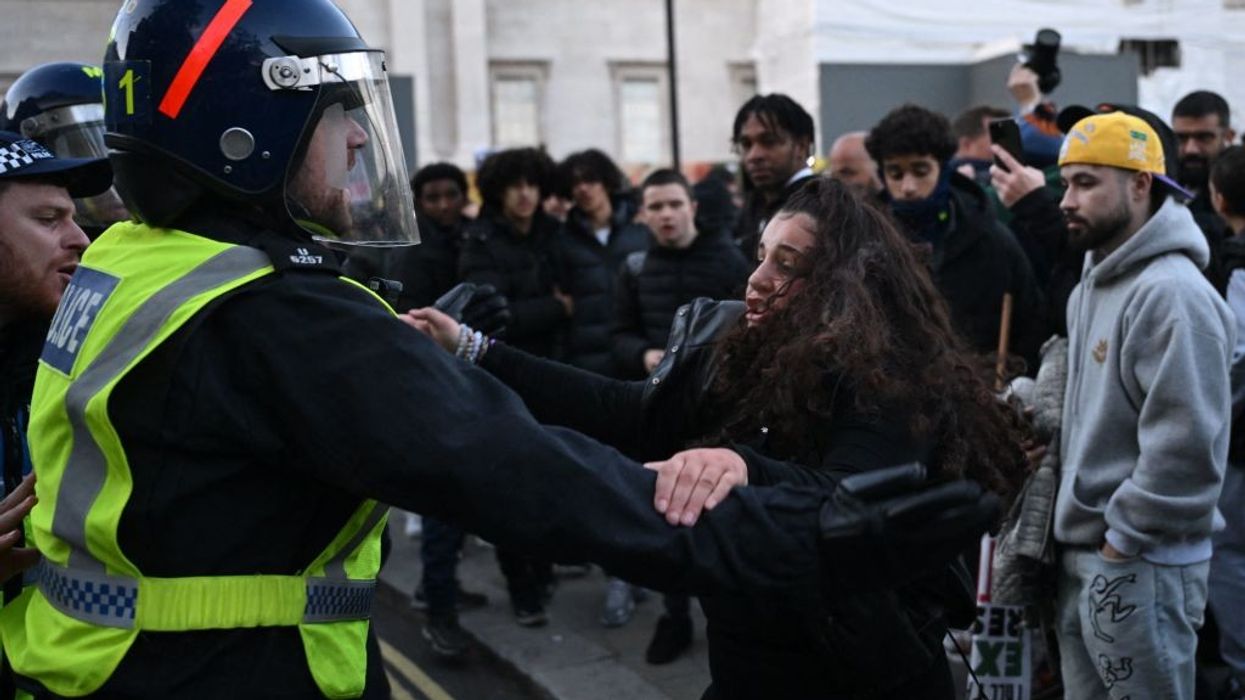TENS of thousands of people rallied on Saturday (14) in London and other UK cities at pro-Palestinian demonstrations, amid police warnings that anyone showing support for the militant group Hamas could face arrest.
Protesters marching through the heart of the British capital were shadowed by a heavy police presence of more than 1,000 officers.
Similar rallies took place in Manchester in northern England, Edinburgh and Glasgow in Scotland, and other UK cities.
In London, demonstrators massed neared BBC News' headquarters before an afternoon rally near prime minister Rishi Sunak's Downing Street office and residence.
Parts of the entrance to the building in central London's Portland Place, where the rally started, were left splattered with red paint thrown by protesters from the Palestine Action group.
The broadcaster has been criticised by supporters of both Israel and the Palestinians.
Some held Palestinian flags and placards - bearing slogans such as "Freedom for Palestine", "End the massacre" and "Sanctions for Israel". Chants of "Rishi Sunak, shame on you" could be heard.
"I think all just people around the world, not just in Britain, must stand up and call for this madness (to end)," Ismail Patel, chairman of the Friends of Al-Aqsa campaign, said at the demonstration in the capital.
"Otherwise, in the next few days, (we) might see a catastrophe unfolding."
'Without issue'
The rallies come as Israel intensifies its war to destroy Hamas, relentlessly pounding the Gaza Strip and deploying tens of thousands of soldiers nearby ahead of an expected ground offensive.
That follows October 7 attack by Hamas, which saw hundreds of its fighters cross the Israeli border to take hostages and kill more than 1,300 people on the streets, in their homes and at a rave party.
The Metropolitan Police said it deployed more than 1,000 officers on Saturday, as the events thousands of miles away reverberate in Britain and elsewhere.
In its latest update, the force said the rally passed "without issue", with seven arrests made.
It added there were eight further arrests during "small pockets of disorder and unacceptable criminality" in nearby Trafalgar Square afterwards.
They related to suspected assaults on emergency workers, allegedly setting off fireworks in public places and suspected public order offences.
Nine officers were treated for minor injuries.
Police and the government had earlier noted a spike in UK anti-Semitic crime and incidents since the Hamas assault. Officers in Sussex, southeast England, arrested a 22-year-old woman on Friday (13) suspected of having made a speech backing Hamas.
A banned terrorist organisation in Britain, its members - or those found guilty of inviting support for it - can be jailed for up to 14 years under UK law.
Corbyn speech
The Met said this week that general expressions of support for Palestinians, including flying the Palestinian flag, were not criminal offences but reiterated that supporting Hamas was a crime.
Ferouza Namaz, 34, a student from Uzbekistan, joined the London protest, arguing that civilians in Gaza were "absolutely innocent".
"Just being Palestinian does not give the rights to kill them. These appalling atrocities have been taking place for so many years," he added.
Israel insists it does not deliberately target civilians in the Gaza Strip or other Palestinian territories.
Jeremy Corbyn, former leader of the main opposition Labour party - who was accused of allowing anti-Semitism to flourish during his four-year party tenure - addressed the London rally.
"If you believe in international law, if you believe in human rights, then you must condemn what is happening now in Gaza by the Israeli army," the now-independent lawmaker said.
But reiterating his unwavering support for Israel, Sunak said on Saturday that Britain stands with the country "not just today, not just tomorrow, but always".
"No words can begin to describe the horror and barbarism unleashed in Israel a week ago," he added.
(AFP)
Thousands rally in solidarity with Palestinians
Police officers shadow protesters marching through the heart of London




